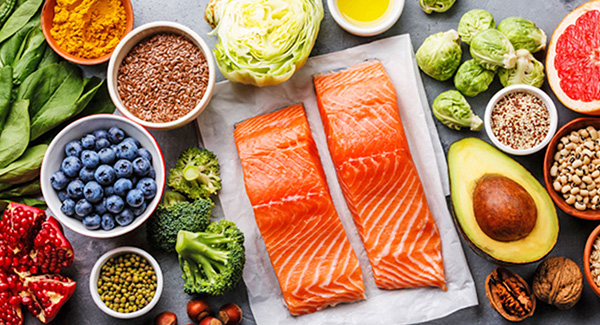Organic Food and Your Health
Is organic food worth the splurge? Get expert insights.
Q: What does "organic" really mean?
A: To earn the United States Department of Agriculture’s, or USDA, organic certification, crops must be grown on land that has been free of prohibited substances – including conventional pesticides, petroleum-based fertilizers and sewage sludge-based fertilizers – for at least three years, and animal products must be raised on organic feed without the use of added hormones or antibiotics.
Q: If organic food has fewer pesticides, and we know pesticides may play a role in the development of rheumatoid arthritis, shouldn't we always eat organic?
A: Not necessarily. According to Jo Ann Hattner, a dietitian and nutrition consultant for Stanford University Medical Center and author of Gut Insight, the most important message for people with arthritis is to eat a healthy diet including at least five servings of fruits and vegetables a day. "But if you’re concerned about the risk of pesticides, hormones and antibiotics, you’re better off buying organic,” says Hattner.
Q: Is there any scientifically proven link between food chemicals and autoimmune diseases like arthritis?
A: There's not much evidence that eating organic makes a difference in autoimmune conditions like rheumatoid arthritis, says Emilio Gonzalez, MD, director and chief of the Division of Rheumatology at the University of Texas Medical Branch in Galveston, Texas. Still, it makes sense to minimize your exposure to undesirable chemicals, hormones and antibiotics – and eating organic is one way to do that. In fact, he says, the best time to go organic is before arthritis sets in. Since organic foods contain fewer pesticides, theoretically, they wouldn't stimulate the immune system, which may lead to inflammation and ultimately arthritis.
Q: Are there nutritional differences between organic and conventional foods?
A: Government agencies like the USDA and American Dietetic Association, or ADA, stand behind their claim that organic foods are not nutritionally superior or safer than conventionally produced food. But there are a few studies suggesting that organically grown produce may be more nutrient-rich than their conventionally grown counterparts. A study from the University of California Davis, for example, found that organically grown berries and corn contained nearly 60 percent more polyphenols – natural antioxidants that may be good for health. And in a second study published in the journal Food Chemistry, researchers found that organically produced tomato juice contained more polyphenols than conventionally grown crops. Why the nutrient boost in organic foods? Scientists theorize that when plants aren’t coated in chemicals to help fight off pests and insects, they develop stronger compounds to protect themselves – not unlike the way we build antibodies when confronted with bacterial ‘bugs.’ If you eat that produce, you get those disease-fighting compounds, too!
Q: Are there any benefits to choosing organic animal products?
A: Organic animal products may also have added benefits. English researchers found that organic milk has higher levels of Omega-3 fatty acids, which may help alleviate arthritis symptoms and enhance health. That may be one reason why organic milk is often richer and creamier than conventional. Other studies have shown that organic milk has higher levels of vitamin E and other antioxidants as well as minerals like calcium, iron, magnesium and chromium.
Q: How do the hormones and antibiotics in conventional animal products affect people with arthritis?
A: If you’re immune-compromised, organic livestock products may be safer than conventional varieties. "When you eat meats, eggs or cheeses that contain antibiotics, you get a dose, too," says Dr. Gonzalez. "So, the next time you have a bacterial infection, there may be a greater chance that your antibiotics won’t work." Beyond that, he says, there's no evidence that conventional foods are bad for people with arthritis.
Q: Does eating organic guarantee that food is free from pesticides?
A: Unfortunately, no. In fact, according to the USDA, 23 percent of organically grown produce contains pesticide residues. These residual chemicals can come from substances already in the soil, some of which have been banned for decades but remain in the ground, or from pesticides that drift onto organic crops from nearby non-organic fields. Still, says Hattner, the growers do their best to produce crops that are pesticide-free.
Q: If I'm not buying organic, what can I do to reduce pesticide exposure from eating conventional foods?
A: First, don't stop eating fruits and vegetables. Even with potentially harmful chemicals, fruits and vegetables offer critical vitamins, minerals and antioxidants that help protect against a whole host of health conditions – not just arthritis. Washing produce with water or a water/vinegar rinse and choosing fruits and vegetables with hard exteriors or peels can help limit your exposure to pesticide residues, says Hattner. So, if you can afford to buy some organic products, consider produce with soft exteriors like peaches, berries, spinach and bell peppers over foods like oranges, bananas and potatoes.
And remember, variety is key. “The most important thing is not to eat the same type of fruit every day,” says Hattner. There are toxins in fruit that are a natural part of the food.” So, if you eat 10 apples a day – organic or not – you’ll be getting a high amount of natural apple toxins.
Organic Labeling
Before a product can be labeled organic, a government-approved certifier inspects the farm where the food is grown to ensure compliance with USDA’s organic standards. But not all organics are created equal. Here’s what the different certifications mean and what to look for at the grocery store:
• “100 percent organic” products must be made with only all organic ingredients.
• “Organic” labeled foods must consist of at least 95 percent organically produced ingredients and may bear the USDA organic seal.
• “Made with organic ingredients” may use this phrase if a product contains at least 70 percent organic ingredients, and it may contain up to three of the organic ingredients on the display panel. For example, soup made with 70 percent organic ingredients may be labeled “soup made with organic tomatoes, corn and potatoes” or “soup made with organic ingredients.”
• Processed products that contain less than 70 percent organic ingredients cannot use the term organic on the main display panel, but may list organic ingredients in the ingredients list.
• Non-organic foods may display truthful claims such as “natural”, “free-range,” “hormone-free” or “sustainably harvested,” but only foods labeled organic meet USDA’s organic certification standards.

Stay in the Know. Live in the Yes.
Get involved with the arthritis community. Tell us a little about yourself and, based on your interests, you’ll receive emails packed with the latest information and resources to live your best life and connect with others.



